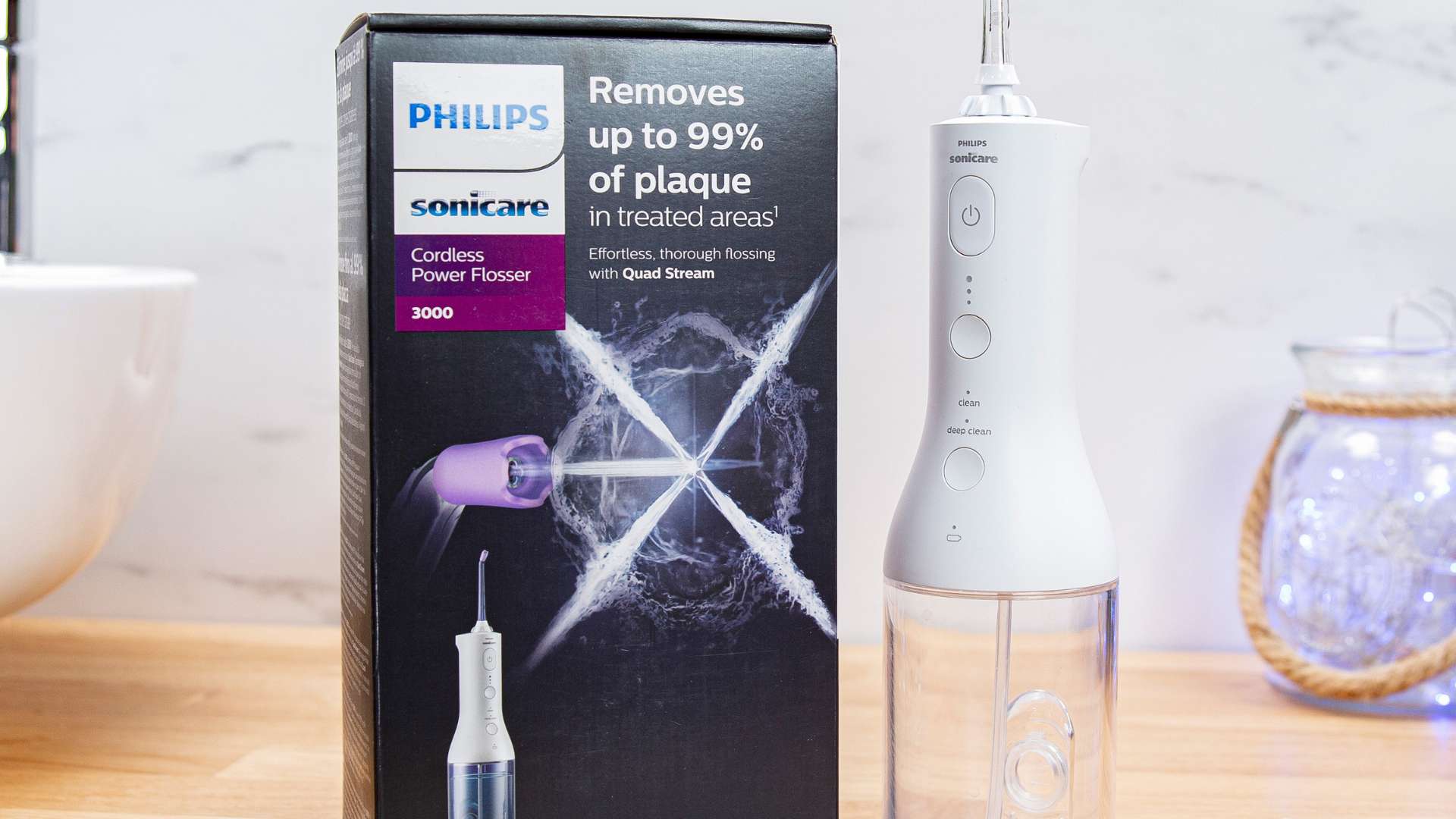
Editor’s note: different power adapters
Update June 2024: Philips originally introduced the Cordless Power Flosser with a USB Type-A to USB Type-C charging cable.
Following, what we believe to be reliability and safety issues with the original Type-C connector, the latest version of this model now has a different, 2 pin power connector built-in, rather than USB Type-C.
Subsequently the power cable provided is now a USB Type-A to ‘small plug cable’ as Philips call it.
Product listings don’t necessarily make it very clear which one you are getting. In many instances, images of both charging ports are shown.
The likelihood is you will get the new style power adapter rather than the Type-C connector.
Part codes for the new variants include: HX3826/31, HX3826/33, HX3826/23, HX3826/21 & HX3826/24.
One of the best cordless flossers that performs as well as you would expect of a Sonicare product
It lacks some textured grip on the handle and the nozzle isn’t the easiest to rotate, but this is more than made up for by the excellent cleaning performance and other features it offers.
The built-in pacer and large 8.4oz (250ml) water tank are useful, but the costly replacement nozzles are inexcusable.
Overall the Cordless Power Flosser 3000 is an excellent water flosser and takes the challenge to market leader Waterpik.
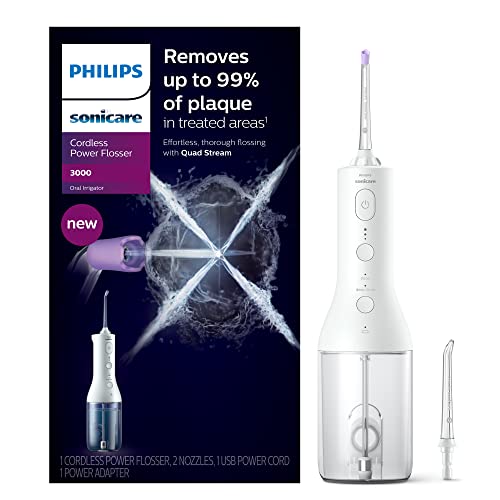
Pros |
Cons |
|---|---|

3 pressure/intensity settings |
Expensive replacement nozzles |

Built-in timer/pacer to encourage even flossing |
The nozzle is a bit difficult to rotate |

USB charger |
Lacks gripping points |
The Cordless Advanced is easier to hold and has a rotating nozzle
The textured grip on the handle of the Waterpik Cordless Advanced and the ease with which the nozzle can be rotated make daily use a little bit better. I’ve got a little extra confidence as I floss. It’s subsequently our top-rated cordless water flosser.
There’s not a lot in it though. It’s not a case of you must buy it over the Cordless 3000. They are both very comparable. The 3000 has a better charger than the Advanced for example. They are similarly priced too.

It’s bulky and not the most grippy, but it’s lighter than the competition
If you haven’t handled a water flosser before, you might be somewhat surprised by the size.
Despite cordless models being the more travel-friendly option, they are a bit bulky, due to the very nature of what they are. If you want to travel light, you probably won’t be including the Power Flosser 3000 in your bag.
An all-plastic construction, the 3000 is wider at the base, thinning towards the top of the unit. This makes it easier to hold, albeit there is a lack of textured surfaces to assist in getting a secure grip. Thankfully you don’t feel like you have a cramped hold of the device like you do on the Waterpik Cordless Select, for example.
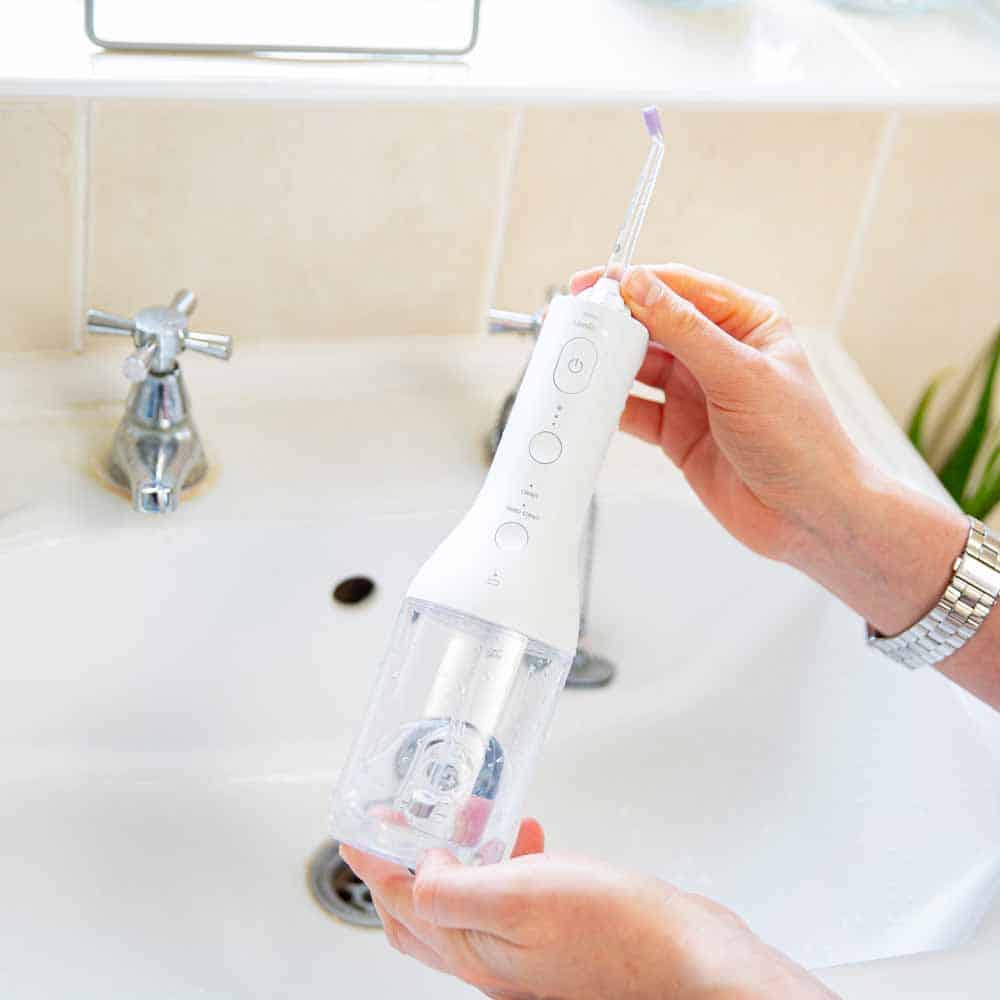
Comparably sized to other cordless models, it is noticeably lighter than the likes of the Waterpik Advanced, by some 2.4oz (70 grams).
The power button has a less pronounced concave design compared to the intensity and mode buttons. All of them can be fairly easily detected by the fingertip and all give some feedback when pressed, if not that satisfying.
Aesthetically there is a lot of similarity with Sonicare toothbrushes, which I like. The 3000 has a clean and minimal look. It’s available in black, white or mint and has a matte finish — there are no gloss plastics like with other models.
The Cordless Power Flosser 3000 does produce up to 77 decibels of sound when in use.
Longer flossing times with the 8.4oz water reservoir
8.4oz/250ml is the capacity of the reservoir on this flosser. This is a little higher than average, which allows for longer flossing times of 60+ seconds, compared to the 30-45 of most.
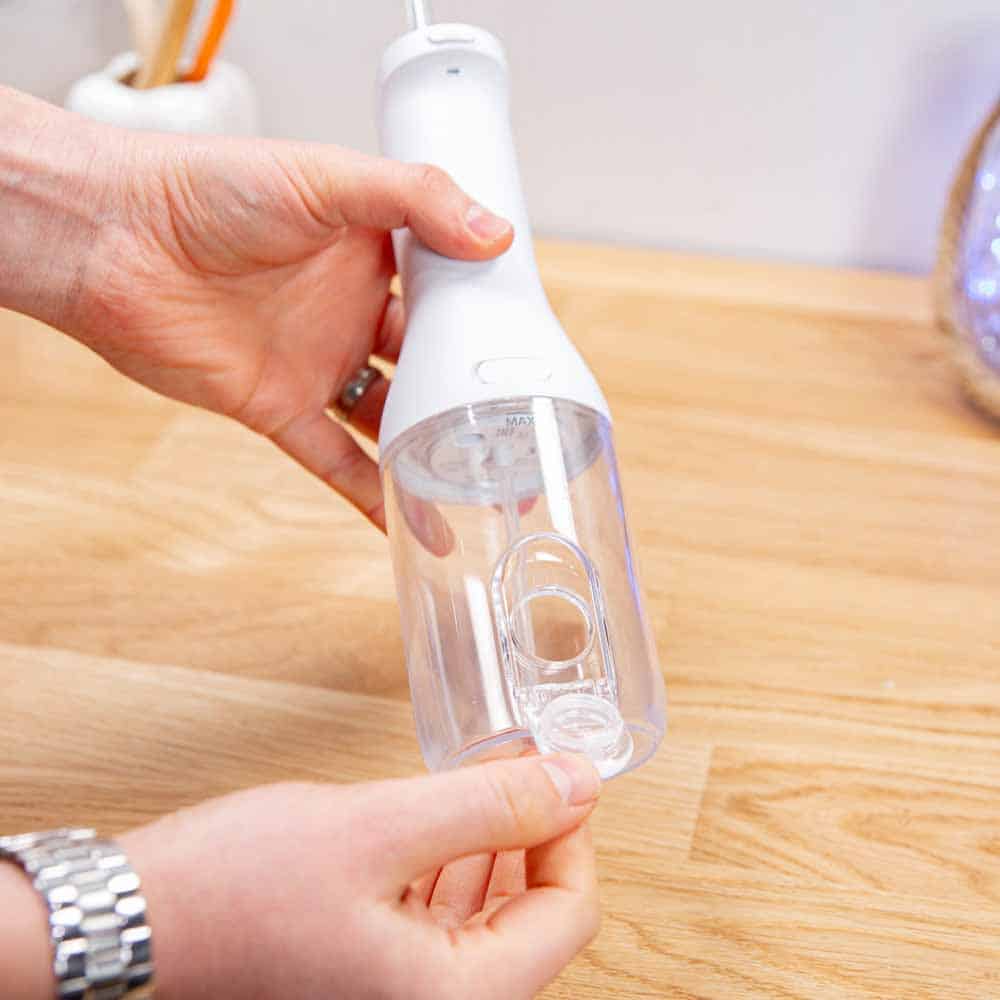
It also means less need to refill the tank, which saves some inconvenience.
The exact running time depends on the cleaning mode and intensity selected.
- Clean mode
- High intensity – 1 minute
- Low intensity – 1 minute and 15 seconds
- Deep clean mode
- High intensity – 1 minute and 5 seconds
- Low intensity – 1 minute and 25 seconds
There are 2 ways to fill the tank. You can either twist and remove it from the handle or open the hinged door on the tank. I think the hinged door is slightly more convenient for everyday use.
The ability to remove the tank entirely makes it easy to clean and dry thoroughly.
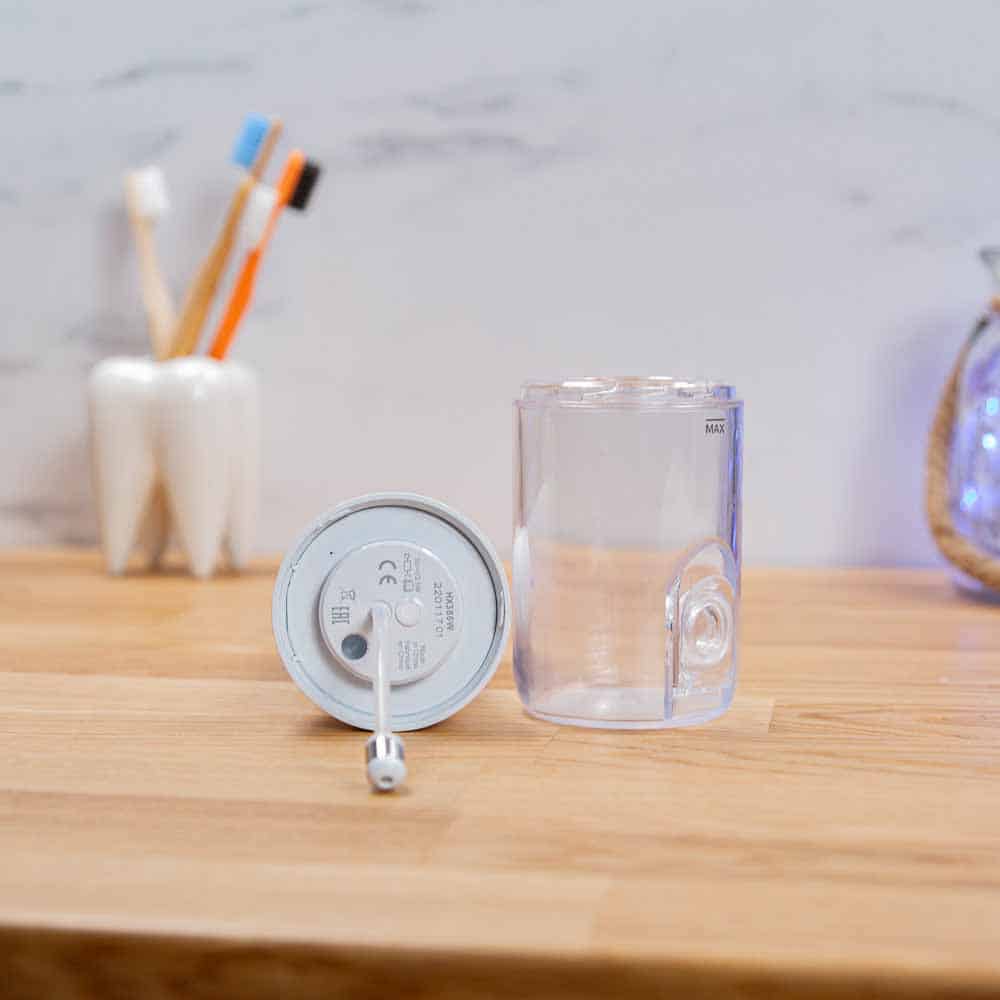
3 intensities and 2 modes – useful, but not a game changer
3 intensities of water flow would have been more than sufficient, but you have the choice of 2 cleaning modes too.
The cleaning modes work slightly differently.
- Clean – This offers a constant water pressure for a great clean.
- Deep clean – The flow of water increases and decreases in intensity. Pulse Wave technology provides a brief pause in the jet of water to allow you to move the nozzle from one space to the next between teeth.
I can’t say I prefer one over the other, they are just different.
The Pulse Wave cleaning action makes it a touch easier to move the nozzle from one interdental space to another, but it isn’t as pronounced as you might expect. There is still a consistent stream of water being pushed through the whole time.
The mode can be changed at any time, using the dedicated mode button. There are LEDs on the handle to show which is selected.
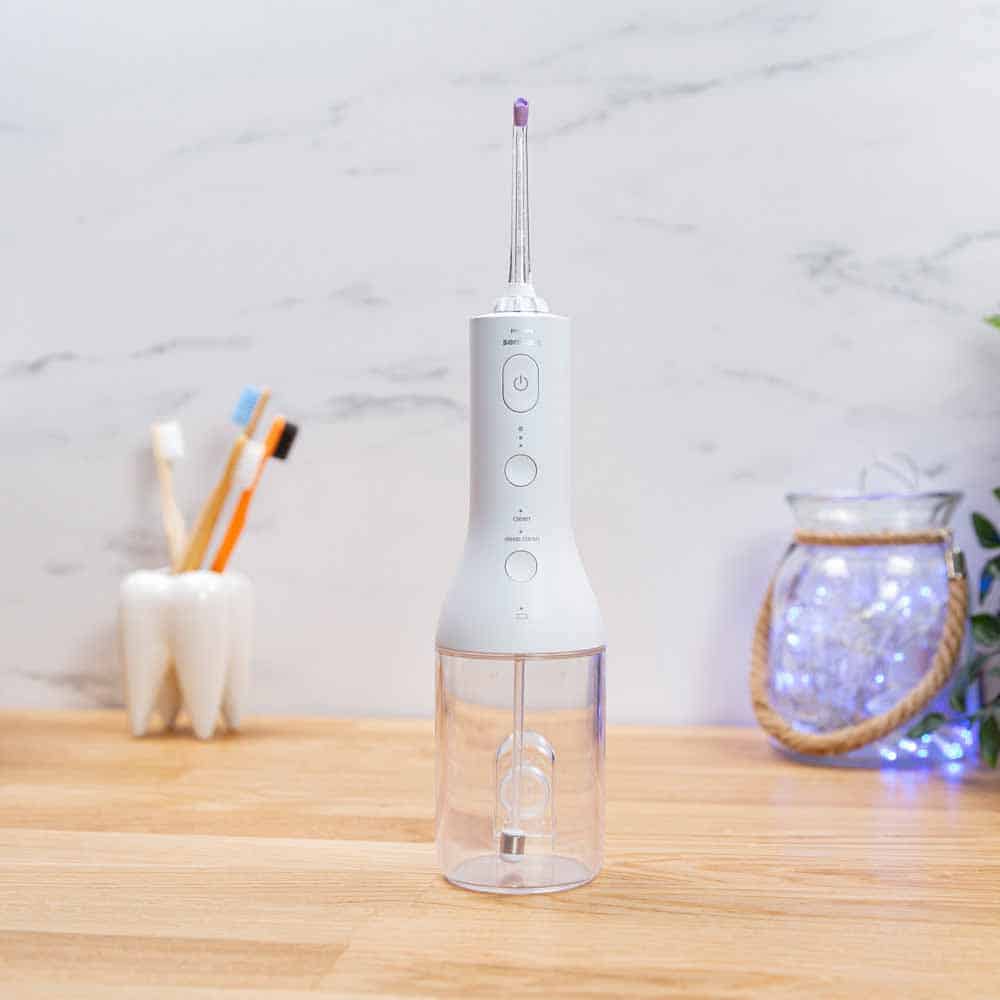
The intensity of the water flow in each mode can be adjusted at any point. There are LEDs on the handle for this too.
- 1 LED – Low intensity
- 2 LEDs – Medium intensity
- 3 LEDs – High intensity
Philips doesn’t publish the PSI for each like competitors might. They are certainly similar to other flossers with multiple intensities. I wouldn’t say that the low is much softer or the high much more intense to make this a must-pick over the competition.
I recommend new water flosser users use the more gentle low mode and increase the intensity over a few weeks.
Power isn’t the key to good results, technique is more important.
The Quad Stream tip is the most impressive of the 3 nozzle designs
Philips has designed 3 different nozzles or flosser tips for its range of water flossers.
Your options are:
- F1 standard
- A standard nozzle with a single stream of water for removing debris and plaque.
- F2 comfort
- A soft rubber nozzle for comfort and ease of positioning for those with sensitive gums.
- F3 quad stream
- A soft rubber nozzle that directs water into a cross shaped (x) stream that gently removes plaque for an effortlessly thorough clean.
All of these nozzles are interchangeable.
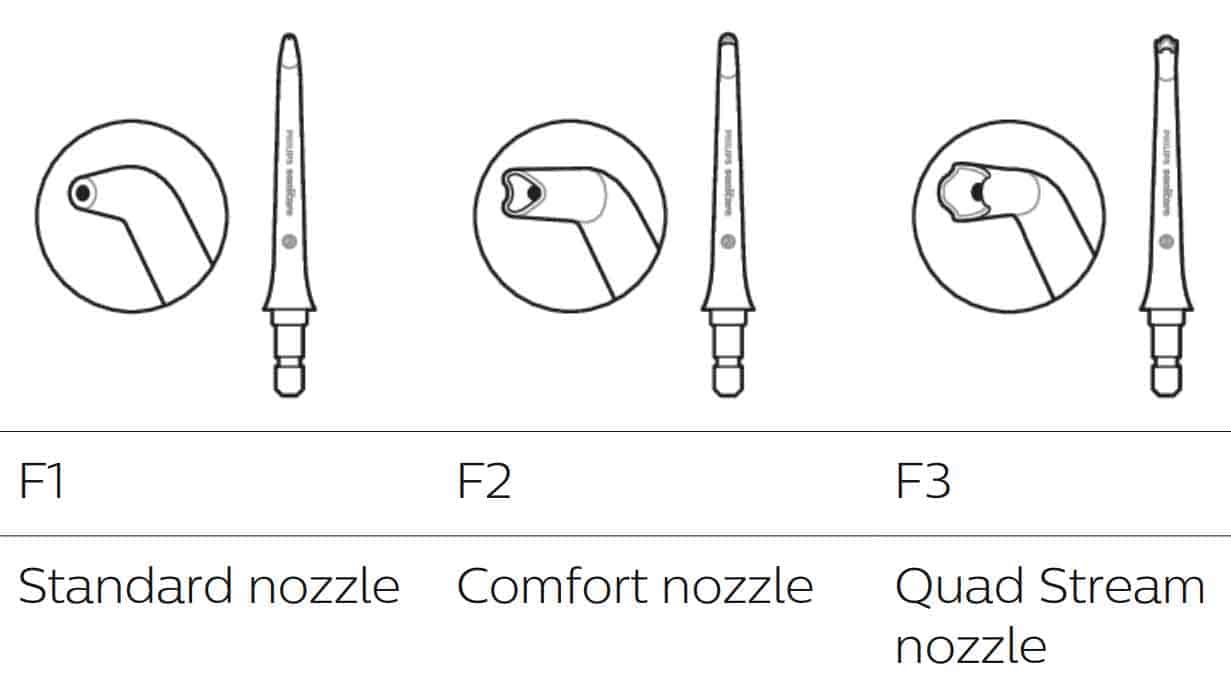
The F1 standard is the style most companies offer with their water flossers. It’s the F3 tip that makes this unique.
The rubber tip of the nozzle causes the water to create an X shape as it comes out of the tip, essentially giving 4 jets with a much wider and larger coverage area.
To me, the X pattern felt a little less intense at times. Other times, it felt more intense depending on where the X hit my gums.
The increased coverage gives a different feel as you clean.
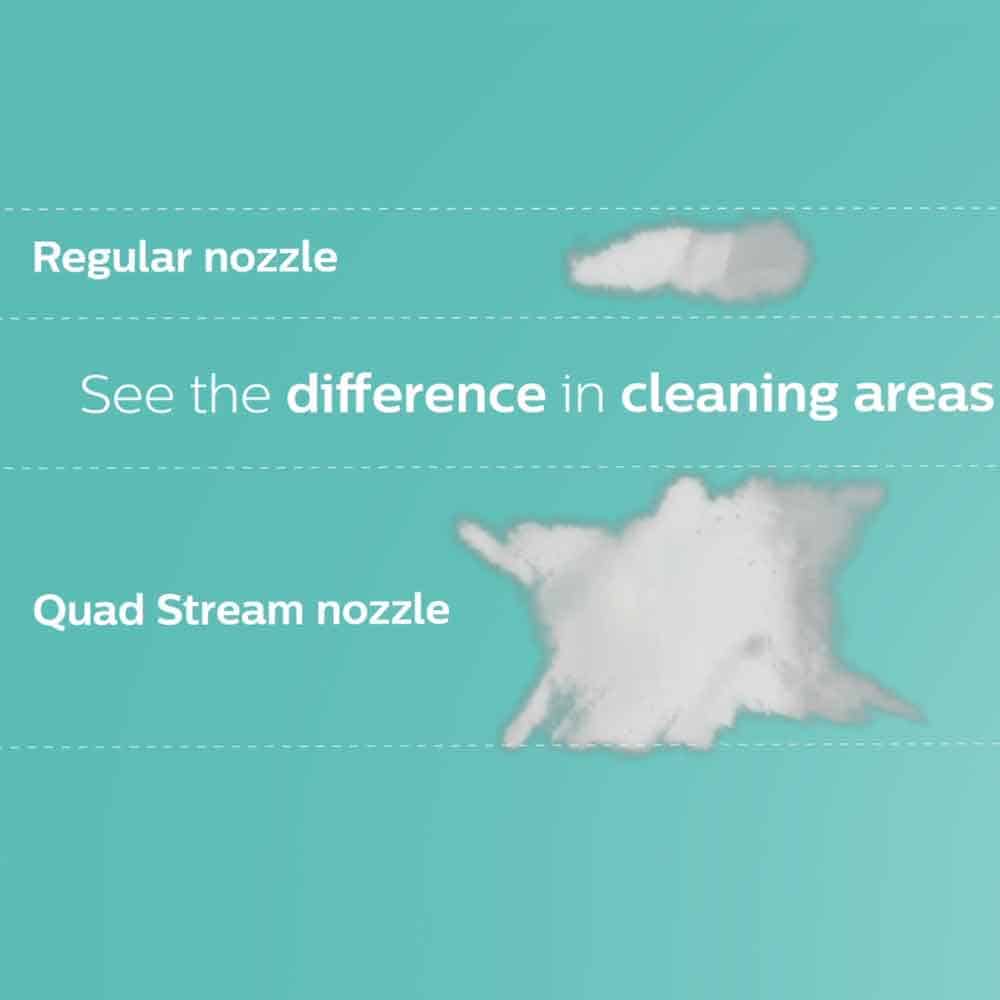
Sonicare’s range of tips is smaller than market leader Waterpik. If you have fixed braces, implants, or bridges, Sonicare doesn’t offer a nozzle with bristles that give the additional mechanical cleaning action, like select Waterpik tips do. It isn’t a deal breaker, the water jet still achieves good results. Fewer choices help reduce confusion and decision fatigue.
The cleaning results are great & clinically proven
My hands-on testing is by no means scientific, but I can’t find a reason to complain about the results I have achieved. I am very pleased. I could feel the difference in my teeth after use and I was amazed at how much debris was left in the sink.
I can’t say it is better or worse than the competition. It’s certainly less hassle than using string floss.
The X shaped water stream that is generated from the F3 quad stream nozzle is very different from the normal jet tip. Yet, for me, the post-use clean feels comparable with either the F1 or F3 nozzles.
Perhaps long term there will be a greater benefit to be gained from the X shaped stream, as some clinical testing by Philips has highlighted.
Philips has conducted various tests with its flosser range, and the cordless 3000 has been proven to remove 99.9% of plaque.
Hopefully, in time we see more independent tests and comparisons to similar products.

The pacer helps you to floss for the right amount of time
An experienced user can thoroughly floss their teeth in around 45 seconds.
Speed isn’t the aim of the game, though — consistency and technique are more important. Taking a bit longer can deliver better results.
The 3000 encourages you to achieve this thanks to its pacer. At 15 second intervals, there is an alert for you to move between the inner and outer surfaces in the upper and lower arches. The idea being you spend 30 seconds per arch.
It continues for up to 120 seconds/2 minutes, at which point it will turn itself off. The reservoir will have long been drained by this point. Not a fan of pacing? It can be disabled.
When using the deep clean mode, you get an added benefit: ‘Pulse Wave technology’. The pressure of the water alternates with a slight pause. The pause is the moment you move from one interdental space to the next. It does exist, but in my opinion, it doesn’t provide quite the seamless water free transition between teeth that you might expect.
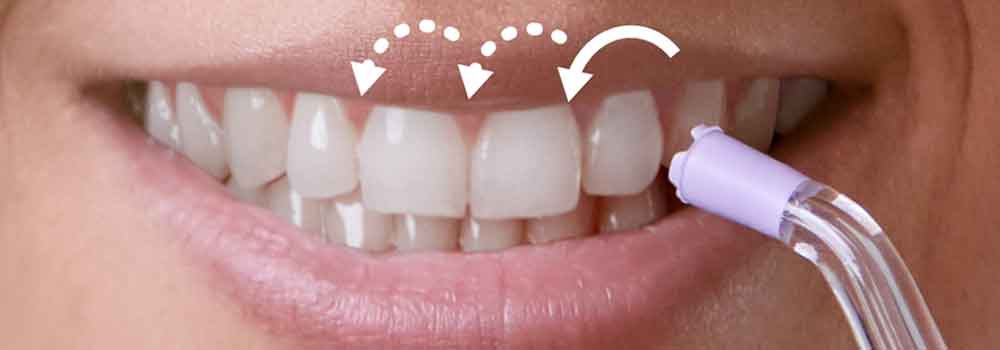
Rotating the nozzle is harder than it should be
Being able to rotate jet tips allows for more accurate control of the water flow and is particularly helpful, in my opinion, when trying to clean the inside surfaces of the teeth.
All of the interchangeable nozzles can be rotated, but doing so when in use is particularly difficult. The mechanism is stiff and far from smooth. Even with the flosser turned off and out of the mouth, it isn’t effortless. Waterpik’s models are far better engineered.
Anyone with dexterity issues best avoid the Cordless 3000.
The travel pouch is a useful accessory
Simple but effective, the black drawstring pouch supplied with the Power Flosser 3000 is a handy accessory to protect the device and stop water from escaping when you are on the go. It is made from a wipe-clean plastic material.
Unlike most flossers, the Cordless 3000 allows a single nozzle to be stored inside the reservoir, by clipping into the base of the unit. Quite innovative.
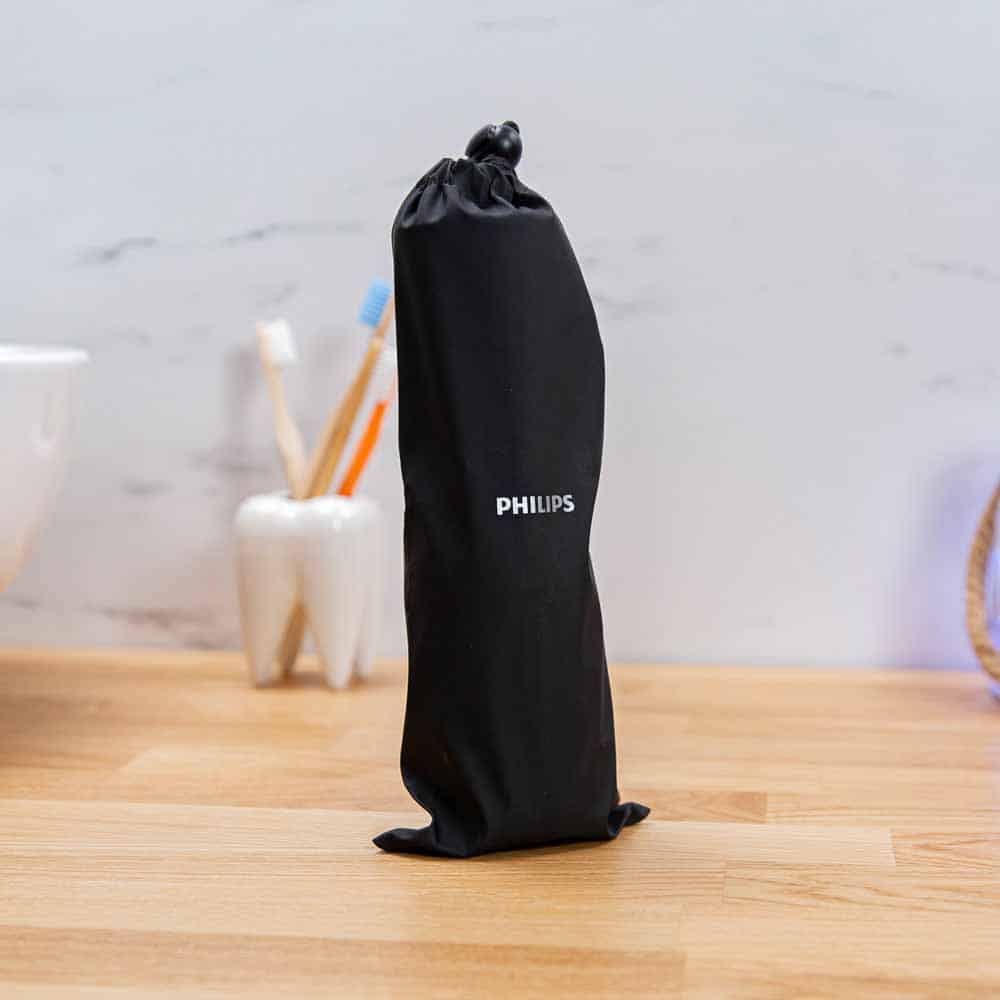
The battery life is 4x better than advertised
54 days of use is what I managed to achieve in my testing of the Cordless 3000. This is very impressive and above the average usage time for a rechargeable cordless flosser. And I was using the most powerful mode.
It is far better than the 14 days claimed on the box and the 25 days stated in the manual.
An LED on the handle gives feedback on the charge level when connected to the charger or not. Unlike many that only alert you when the power is low, it uses different light patterns for different charge levels.
- Full battery – Solid green LED
- Medium battery – Flashing green LED
- Low battery – Flashing amber LED
- Empty – Flashing amber for 5 seconds and the power flosser turns off automatically
- Charging battery – Flashing green LED
USB charging
Recharging of the Lithium-Ion (Li-Ion) battery, sealed inside the handle is achieved via the provided USB Type A to USB small plug cable (older variants had a USB type c port).
The 2 pin proprietary style charging port on the back of the flosser is accessible by removing the rubber cover that fits into it to protect against water ingress.
Whilst I would prefer not to have to deal with fiddly little port covers, this is one of the better configurations. The cover is physically attached and there is enough play that it does not get put under too much strain.
A USB to 2 pin power adapter supporting 100-240v is supplied, so that you can connect it to a power outlet.
It’s somewhat surprising this is included given the 1100, 2100 and 3100 Series toothbrushes don’t come with one based on reducing environmental impact. What’s different here?
If you’d rather, it can be charged from other USB power sources such as a computer or battery bank.
A full charge can take up to 8 hours.
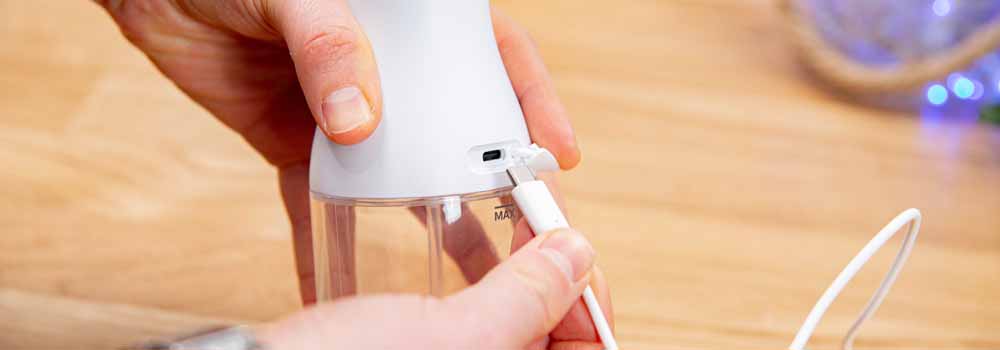
Competitively priced to comparable flossers
The Cordless 3000 has a recommended retail price of $79.99 but sells on average for around $70.
It’s about $15-20 cheaper than the similarly featured Cordless Advanced from Waterpik.
However, ownership costs over 3 years are very comparable. The Cordless 3000 costs around $102.50 compared to the $110 of the Advanced.
Sonicare nozzles cost about $6.50 a time vs. the $5 Waterpik tips.
My slight preference is the Waterpik, but there is little between the two.
No user-serviceable parts and an industry average 2 year warranty
2 years is the warranty period of the Cordless Power Flosser 3000, which is on par with other brands.
Sonicare hasn’t gone above and beyond here, and neither has it made repairability easier. There are no user-serviceable parts to this device. In other words, you can’t fix it yourself.
It feels solid and durable, and upon inspection everything appears to be designed with longevity in mind. There’s a strong seal on the reservoir door and a nice flexibility to the USB port cover. I’ve no reason to be concerned about long term durability.
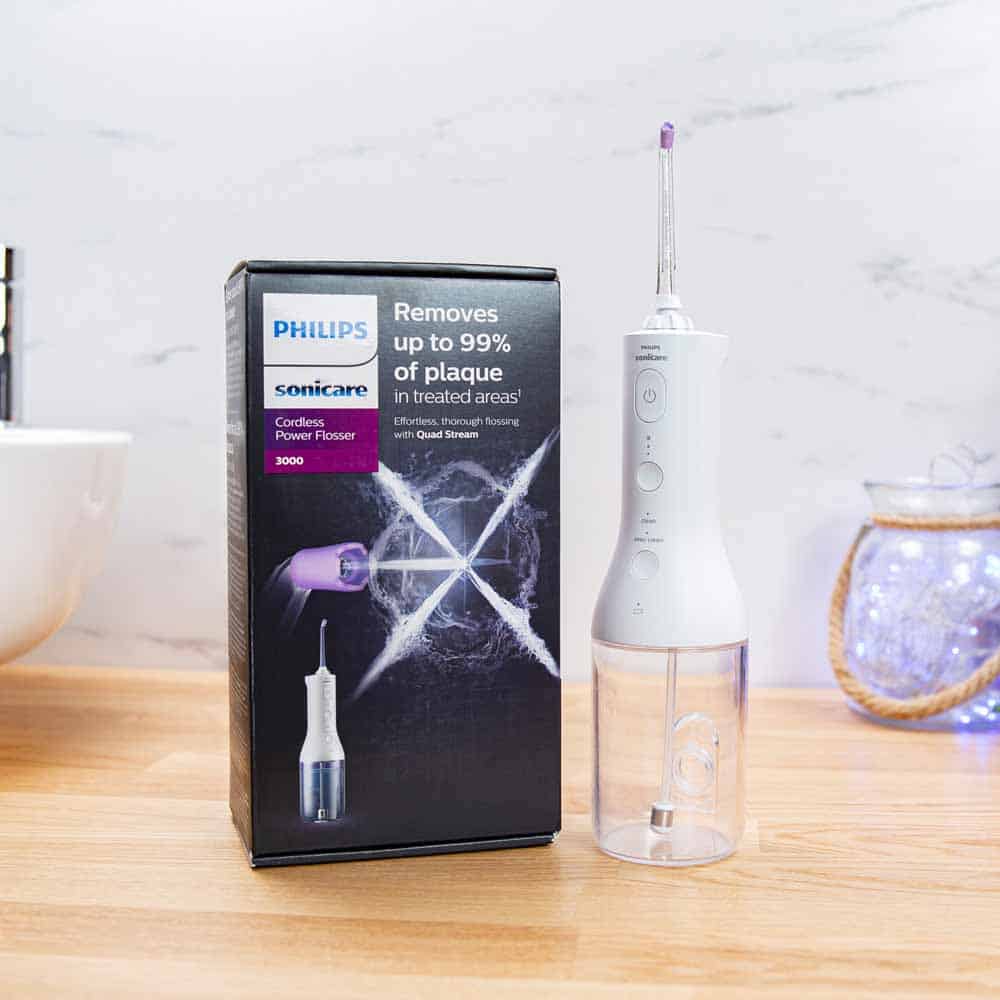
Environmental impact
As it stands, there haven’t been any studies to specifically measure the environmental impact of water flossers.
However, a 2020 study found that an electric toothbrush has around 11 times the environmental impact of a manual toothbrush. The equivalent is likely to be true of a water flosser compared to
string floss or interdental brushes.
If you can use string floss or interdental brushes, it will be better for the planet than opting for the Cordless 3000. It is interdental brushes that are the most effective of all flossing tools.
With regards to the Cordless 3000 specifically, it isn’t packed with lots of unnecessary extras. The USB charging cable can be repurposed.
Petroleum-based plastics are used, rather than plant-based, thus using more of the planet’s finite resources.
Unfortunately, Philips doesn’t currently offer any recycling program for their flossers or consumables.
Conclusion: premium performance from a premium brand
This is an excellent cordless water flosser. You wouldn’t know it’s Sonicare’s first attempt at making one.
I don’t think it is as comfortable in the hand, or as easy to use, as the Waterpik Cordless Advanced. Rotating the nozzle in use is much more difficult.
But, it is a very good alternative. The pacer and larger water reservoir are arguably better.
If you are looking for a cordless water flosser, you could do a whole lot worse.
Size guide
- Water Flosser Height With Nozzle - 30.8cm / 12.1 inches
- Width - 6.5cm / 2.6 inches
- Depth/thickness - 6.5cm / 2.6 inches
- Weight with nozzle (no water) - 289g / 9.6oz
- Package weight - 600g / 21.2oz
Noise
- 77dB
Country of manufacture
- China
FAQ
How to activate or deactivate the pacer on the cordless 3000?
- With the Cordless Power Flosser off, press and hold the intensity selection button for 3 seconds.
- When deactivated, the battery indicator light will flash amber once.
- When activated, the battery indicator light will flash green twice.
Disclaimer
The Sonicare Cordless Power Flosser 3000 spoken about in this review was provided by Philips PR department. Electric Teeth did not purchase this model. No financial reward was provided to conclude the review the way that we did and Philips had no editorial control over the content.



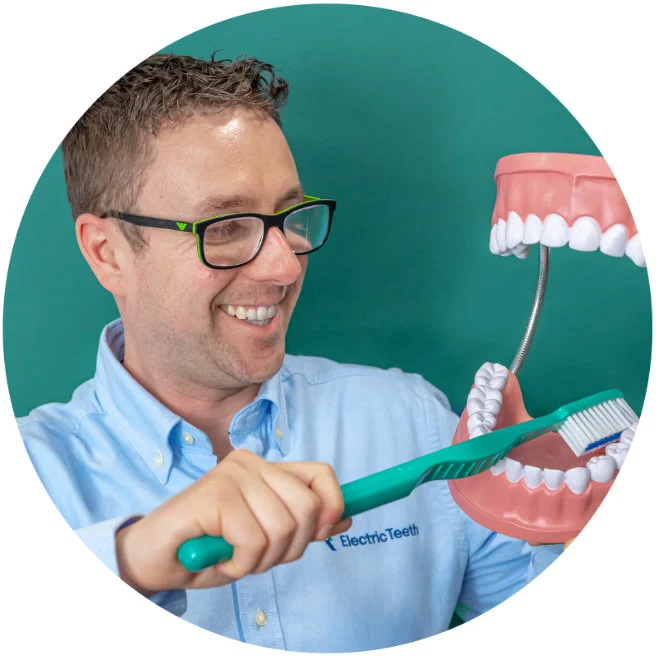
Disclaimer: I just searched for the beginning of this comment from the end, and the scroll is embarrassing. I do not expect anyone to read any or all of this, and if you do, I apologise for wasting your time. Definitely nothing important enough to merit such a self-indulgent dearth of respectable filter for public comment posts. It is blatantly obnoxious and even more obnoxious of me to write some more just to warn you bc I am obnoxiously deciding not to re-read it bc the whole problem stems from lack of sleep. Im sleep typing. Please forgive me and the ridiculous things I misspell when trying to say unimportant things w/o leaving out any details.
Thank you, Jon, for sharing your thorough examination and helpful accounts of your experiences w various water flossers. I have been dizzy researching them for the first time. I ended up picking the sonicare cordless just based on price (extra Amazon discount) once i had quickly narrowed it down to Waterpik and phillips. I love my sonicare toothbrush, but I have always had a nostalgic fondness for Waterpik. I was infamous as a child for “decorating” the bathroom using my father’s OG waterpik ages ago, but i have never properly used a water flosser before now. I have to say i was disappointed by the “deep clean” and quad nozzle gimmicks. Both the surface/mouth clean and the overall pressure felt very underwhelming. I made certain it was fully charged the first time as well as the 2ⁿᵈ and 3ʳᵈ. I may also have misunderstood the instructions for operation in my novel foray into this branch of oral hygiene technology. I did not accurately glean the subtle implications of “pulsing”:“deep clean” vs “steady stream” : “(regular) clean” as it is counterintuitive to me to expect “deep” to be anything besides more intense than “not deep.” I will also admit to my incomplete interest in the study of every sentence available on the subject until I had already formed an unfavourable opinion - albeit premature, i realise - and had begun simply looking up info / specs (suspiciously unavailable from Phillips) in order to compare against any alternative devices I thought might be a better exchange. If i had any space in my bathroom and were not travelling so often, I would absolutely choose a countertop waterpik. I have wasted far too much time wishful internet researching / shopping to try and dig up a creative selling point that would magically manifest a convincingly obvious winner: a flosser w all the perks of size and power and customisations without any of the deal breakers (i.e. fairy dust that makes counter or storage space inconsequential and invokes a hex that holds prices under $50)…sadly, I could not decipher this kind of incantation from your numerous reviews, but they were relevant and informative, nonetheless, so again, thank you.
Aside from my gratitude, I was inspired to comment bc you officially convinced me that Phillips had, indeed, omitted the psi / water pressure specs from all product info sources that I (a consumer) could access(…intentionally, perhaps?? But why…?) And it just so happened to be a salient detail imho, seeing as I was displeased with my weaksauce flossing experience. Long story (already; will try to keep it) short: I had a pleasant chat w Roger in the customer service chat interface servicing phillips USA (phillips uk does not offer live chat for household products 🤷♀️). Upon collection of my psi query along w all the personal details he must request from me, he affably disappeared for ab 5 minutes (periodically checking in, though - top marks for Roger), and when he returned, revealed that “according to an instructional video, the psi is 40-130 depending on the adjustable setting level.” I have screen shots of this reply, as well as the final comments that left me less than convinced, but I will attest to my pinning him down before we ended that chat *specifically* to confirm the authenticity and accuracy of those numbers (which he did). So, im going to play around w my flosser to try and elicit anything like what i imagine 130 psi might feel like. Hoping to find the magic combo and whatever sweet spot this gizmo might offer my aging gums. I hope this turns out to be accurate enough to pass for information and might even be helpful to someone one day.
Lastly: my unit came with the alternative charging cord / cable plug. It is a 2 pin connection that allows the removable cord to maintain all metal contacts enclosed in plastic insulation, and the 2 “male end” pins recessed in the charging port on the handle are securely sealed off from any moisture by the silicone charging port cover. In other words: the cord and outlet adaptor are only IPX4 / not so water-friendly as the rest of the unit. As such, I imagine this design is better suited to the environment and operating conditions in which they are most likely to be used. 🤷♀️
Sorry, that was a lot. The end.
Thanks for the feedback and details on your expereince.
I'm sorry to read you felt a bit underwhelmed with th eexpereince it gave. Obviously you need to find a product you are happy with, but power isn't the answer all of the time. Technique has a big part to play in how effective the device is. Too much power can actually be damaging to the gums.
Interesting on the PSI of 40-130 you got from Philips customer service. I can't confirm or deny these but I would be somewhat surprised if it was 130 at the top end, but possible.
One can only go by the feeling that we get when using the product, unless we really conduct some more lab style tests to measure such.
We have recently become aware of the alternative power adapter and are due to make some updates to our content on the back of this. We were trying to get an explanation from Philips as to why it has changed/this one is available, but no such luck so far. Our thouhts are safety related so there is no metal connectors exposed as per your comment.
Mine has just died -or at least I guess so- when I plug it all LEDs indicators blink 10 times and it won't charge. I'm looking for some forums or information about this behavior and nothing.
Do you have any idea what this is?
Hey, sorry to hear it has stopped working.
I haven't had another report of this yet. Best to get in contact with Philips for repair/replacement.
Why aren't these available for purchase? I have the original air flosser from Phillips. I adore it but it is getting old. I can't buy a replacement
because it is discontinued. Now I can't seem to find anything but the bulky countertop models for sale.
They have just been launched and should be available to buy from Philips and other retailers very soon. I am afraid I can't say specifically when they will be in stock, but it shouldn't be very long to wait.
Great -- thanks, Jon!